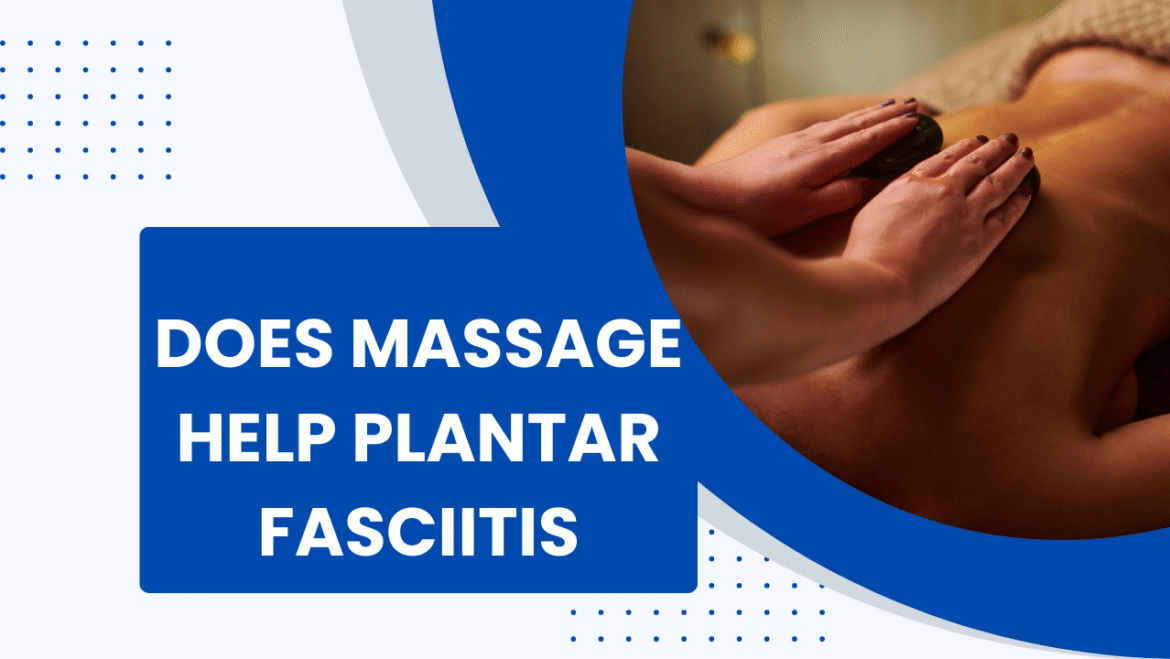Does Massage Help Plantar Fasciitis? Pain Relief and Healing Guide
What is Plantar Fasciitis?
Plantar fasciitis is a common cause of heel pain, caused by inflammation of the plantar fascia — the thick ligament that connects your heel bone to your toes. It supports the arch of your foot and absorbs shock. When strained repeatedly, it can tear and become inflamed.
Does Massage Help with Plantar Fasciitis?
Yes, massage therapy is effective in reducing pain, promoting healing, and improving flexibility in patients with plantar fasciitis. It’s often recommended alongside stretching, icing, and proper footwear.
Benefits of Massage for Plantar Fasciitis:
- Increases blood flow to the plantar fascia
- Breaks down scar tissue
- Reduces tension in surrounding muscles (calves, Achilles tendon)
- Releases trigger points in the arch and heel
- Improves mobility and flexibility
- Provides natural pain relief without medications
Questions Users Commonly Ask:
Can massage make plantar fasciitis worse?
Not if done correctly. Overly aggressive massage can irritate the area. Gentle to moderate pressure is ideal.
What’s the best massage for plantar fasciitis?
Deep tissue massage, trigger point therapy, and cross-fiber friction are among the best.
How often should I get a massage for heel pain?
2–3 times a week initially, with daily self-massage. Maintenance once a week or bi-weekly.
Can I massage plantar fasciitis at home?
Absolutely! Self-massage using a tennis ball, your thumbs, or massage rollers is very effective.
Best Types of Massage for Plantar Fasciitis
1. Deep Tissue Massage
Targets the deeper layers of muscle and fascia, especially in the arch and calf.
2. Trigger Point Therapy
Addresses muscle knots that refer pain to the heel.
3. Myofascial Release
Stretches the fascia gently to reduce stiffness.
4. Cross-Fiber Friction Massage
Encourages realignment and healing of torn tissue fibers.
At-Home Self-Massage Techniques
Tennis Ball Roll:
- Sit down and place a tennis ball under your foot
- Roll it back and forth for 5–10 minutes per foot
- Do this 2–3 times daily
Ice Bottle Massage:
- Freeze a plastic water bottle
- Roll it under your foot for 10 minutes
- Helps reduce inflammation and pain
Thumb Pressure:
- Use your thumbs to apply circular pressure to the arch
- Focus on tender spots near the heel
Massage Frequency for Plantar Fasciitis Recovery
| Pain Level | Recommended Massage |
|---|---|
| Mild | Self-massage 3–4x weekly |
| Moderate | Weekly professional + self |
| Severe/Chronic | 2x/week professional care |
Expert Insights
According to the American Academy of Orthopaedic Surgeons (AAOS), non-invasive treatments like manual therapy and soft tissue work are highly beneficial for plantar fasciitis relief. Combined with stretching and foot care, massage can speed up recovery.
A study in the Journal of Physical Therapy Science found that massage therapy significantly reduced plantar fascia thickness and pain intensity over a 4-week period.
Other Helpful Treatments (Complement Massage)
- Calf and plantar fascia stretches
- Night splints
- Supportive shoes/orthotics
- Cold compress/ice massage
- Weight management
When to See a Specialist
Massage may not be enough if:
- Pain lasts longer than 2 weeks despite treatment
- You feel tingling, numbness, or swelling
- The arch collapses or you develop a limp
Visit a podiatrist or physical therapist for a detailed evaluation and personalized plan.
Final Thoughts
Massage for plantar fasciitis isn’t just soothing — it’s scientifically proven to help relieve pain, reduce inflammation, and restore mobility. Whether you book professional sessions or use home techniques like a tennis ball or ice bottle, consistent massage therapy can significantly shorten recovery time.


Add Comment